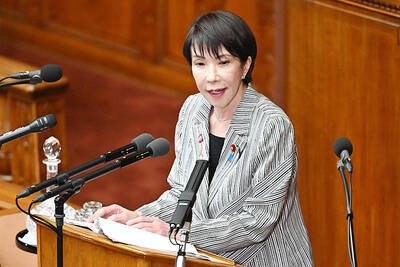China appeared keen yesterday to avoid a brawl with the US over trade and currency stances, brushing aside US President Barack Obama’s criticisms and stressing that the world’s two biggest economies share a stake in stable ties.
Chinese Assistant Foreign Minister Liu Zhenmin (劉振民) did not directly address Obama’s comment on Sunday that Washington was fed up with China’s trade and currency practices.
“The meaning of President Obama’s comments is a question that you should ask the White House and the State Department spokespeople,” Liu told a news briefing.

Photo: EPA
“China and the United States are also economic partners, each of which is important to the other,” Liu told a briefing about Chinese Premier Wen Jiabao’s (溫家寶) attendance at ASEAN and East Asia summits in Bali, Indonesia, this week.
The East Asia Summit will be the first attended by a US president. Obama will meet Wen during the meetings, Liu said.
“I think that along with the development of economic globalization and the development of Asia-Pacific regional cooperation, China and the United States have massive potential to further strengthen economic and trade cooperation,” he said.
Tension had been building in the lead-up to the annual APEC forum gathering over a proposed US-led free-trade deal that Washington wants as a counterbalance to Chinese influence, but which China sees as an attempt to force it to play by US rules.
A day after talks with Chinese President Hu Jintao (胡錦濤) during the APEC summit in Hawaii, Obama used some of his toughest language yet against Beijing. He urged it to take on the responsibilities of a “grown up” economy and stop “gaming the system.”
Meanwhile, ASEAN nations yesterday backed away from establishing a united front against China over territorial disputes in the South China Sea, as Beijing warned against the initiative.
The Philippines is pushing for a joint stand on the issue among ASEAN leaders meeting on Bali this week, according to an internal document obtained by reporters.
China has caused disquiet in Washington and Asian capitals with its claim to all of the South China Sea, a region that encompasses vital shipping lanes and which is believed to sit atop vast oil and mineral reserves.

The Central Weather Administration (CWA) yesterday said it expected to issue a sea warning for Typhoon Fung-Wong tomorrow, which it said would possibly make landfall near central Taiwan. As of 2am yesterday, Fung-Wong was about 1,760km southeast of Oluanpi (鵝鑾鼻), Taiwan’s southernmost point, moving west-northwest at 26kph. It is forecast to reach Luzon in the northern Philippines by tomorrow, the CWA said. After entering the South China Sea, Typhoon Fung-Wong is likely to turn northward toward Taiwan, CWA forecaster Chang Chun-yao (張峻堯) said, adding that it would likely make landfall near central Taiwan. The CWA expects to issue a land

Taiwan’s exports soared to an all-time high of US$61.8 billion last month, surging 49.7 percent from a year earlier, as the global frenzy for artificial intelligence (AI) applications and new consumer electronics powered shipments of high-tech goods, the Ministry of Finance said yesterday. It was the first time exports had exceeded the US$60 billion mark, fueled by the global boom in AI development that has significantly boosted Taiwanese companies across the international supply chain, Department of Statistics Director-General Beatrice Tsai (蔡美娜) told a media briefing. “There is a consensus among major AI players that the upcycle is still in its early stage,”

The Central Weather Administration (CWA) yesterday said it is expected to issue a sea warning for Typhoon Fung-wong this afternoon and a land warning tomorrow. As of 1pm, the storm was about 1,070km southeast of Oluanpi (鵝鑾鼻), Taiwan’s southernmost point, and was moving west-northwest at 28 to 32kph, according to CWA data. The storm had a radius of 250km, with maximum sustained winds of 173kph and gusts reaching 209kph, the CWA added. The storm is forecast to pass near Luzon in the Philippines before entering the South China Sea and potentially turning northward toward Taiwan, the CWA said. CWA forecaster Chang Chun-yao (張峻堯) said

Japanese Prime Minister Sanae Takaichi yesterday said that China using armed force against Taiwan could constitute a "survival-threatening situation" for Japan, allowing the country to mobilize the Japanese armed forces under its security laws. Takaichi made the remarks during a parliamentary session while responding to a question about whether a "Taiwan contingency" involving a Chinese naval blockade would qualify as a "survival-threatening situation" for Japan, according to a report by Japan’s Asahi Shimbun. "If warships are used and other armed actions are involved, I believe this could constitute a survival-threatening situation," Takaichi was quoted as saying in the report. Under Japan’s security legislation,